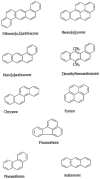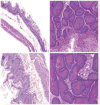Polycyclic aromatic hydrocarbons and digestive tract cancers: a perspective
- PMID: 22107166
- PMCID: PMC3247201
- DOI: 10.1080/10590501.2011.629974
Polycyclic aromatic hydrocarbons and digestive tract cancers: a perspective
Abstract
Cancers of the colon are most common in the Western world. In majority of these cases, there is no familial history and sporadic gene damage seems to play an important role in the development of tumors in the colon. Studies have shown that environmental factors, especially diet, play an important role in susceptibility to gastrointestinal (GI) tract cancers. Consequently, environmental chemicals that contaminate food or diet during preparation become important in the development of GI cancers. Polycyclic aromatic hydrocarbons (PAHs) are one such family of ubiquitous environmental toxicants. These pollutants enter the human body through consumption of contaminated food, drinking water, inhalation of cigarette smoke, automobile exhausts, and contaminated air from occupational settings. Among these pathways, dietary intake of PAHs constitutes a major source of exposure in humans. Although many reviews and books on PAHs and their ability to cause toxicity and breast or lung cancer have been published, aspects on contribution of diet, smoking and other factors toward development of digestive tract cancers, and strategies to assess risk from exposure to PAHs have received much less attention. This review, therefore, focuses on dietary intake of PAHs in humans, animal models, and cell cultures used for GI cancer studies along with epidemiological findings. Bioavailability and biotransformation processes, which influence the disposition of PAHs in body and the underlying causative mechanisms of GI cancers, are also discussed. The existing data gaps and scope for future studies is also emphasized. This information is expected to stimulate research on mechanisms of sporadic GI cancers caused by exposure to environmental carcinogens.
Figures






References
-
- National Cancer Institute-Surveillance Epidemiology and End Results (NCI- SEER) Cancer of colon and rectum. 2008 http://seer.cancer.gov/statfacts/html/colorect.html.
-
- Joslyn G, Carlson M, Thliveris A, Albertsen H, Gelbert L, Samowitz W, Groden J, Stevens J, Spirio L, Robertson M, Sargeant L, Krapcho K, Wolff E, Burt R, Hughes JP, Warrington J, Mc Pherson J, Wasmuth J, Le Paslier D, Abderrahim H, Cohen D, Leppert M, White R. Identification of deletion mutations and three new genes at the familial polyposis locus. Cell. 1991;66:601–613. - PubMed
-
- Kinzler KW, Vogelstein B. Lessons from hereditary colorectal cancer. Cell. 1996;87:159–70. - PubMed
-
- World Cancer Fund and the American Institute for Cancer Research. Food, nutrition and the prevention of cancer: a global perspective. American Institute for Cancer Research; Washington: 1997. - PubMed
-
- Cross AJ, Sinha R. Meat-related mutagens/carcinogens in the etiology of colorectal cancer. Environ Mol Mutagen. 2004;44:44–55. - PubMed
Publication types
MeSH terms
Substances
Grants and funding
- R03 CA130112/CA/NCI NIH HHS/United States
- 1R01CA142845-01A1/CA/NCI NIH HHS/United States
- 5R25GM059994-11/GM/NIGMS NIH HHS/United States
- S11 ES014156/ES/NIEHS NIH HHS/United States
- R01 CA142845/CA/NCI NIH HHS/United States
- U54 MD007593/MD/NIMHD NIH HHS/United States
- 1R03CA130112-01/CA/NCI NIH HHS/United States
- R25 GM059994/GM/NIGMS NIH HHS/United States
- T32 HL007735/HL/NHLBI NIH HHS/United States
- 1F31ES017391-01/ES/NIEHS NIH HHS/United States
- F31 ES017391/ES/NIEHS NIH HHS/United States
- 1F31ES019432-01A1/ES/NIEHS NIH HHS/United States
- 5T32HL007735-12/HL/NHLBI NIH HHS/United States
- F31 ES019432/ES/NIEHS NIH HHS/United States
- 5 S11ES014156/ES/NIEHS NIH HHS/United States
LinkOut - more resources
Full Text Sources
